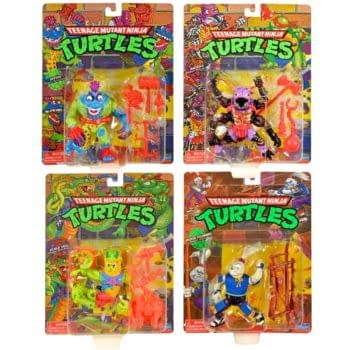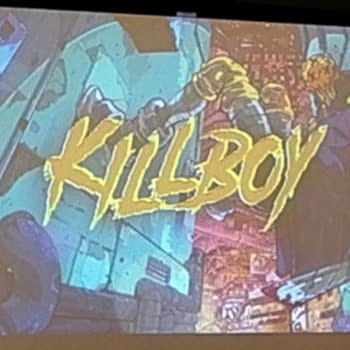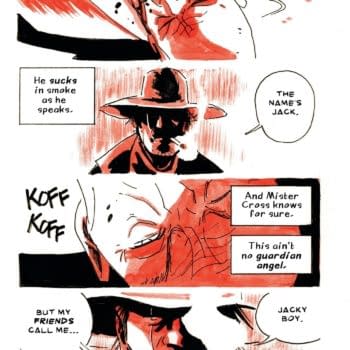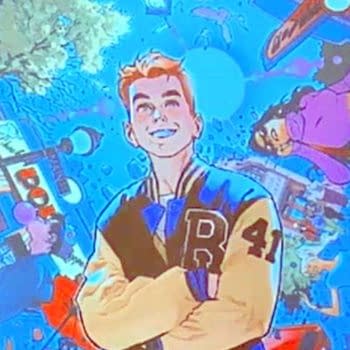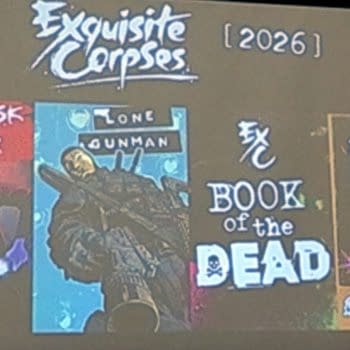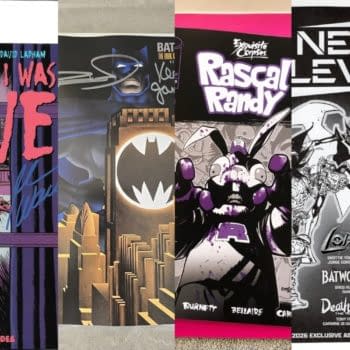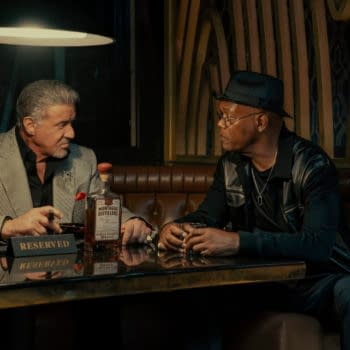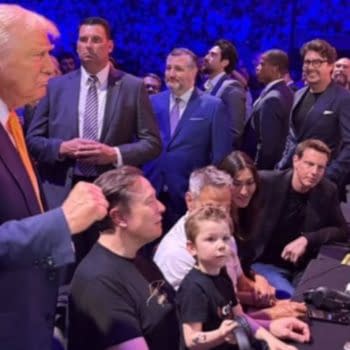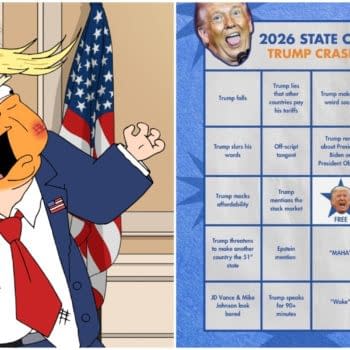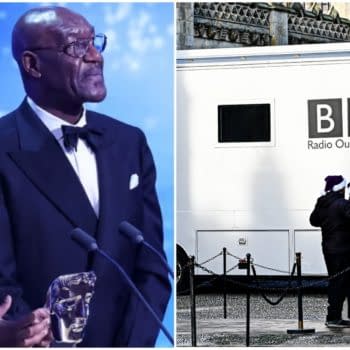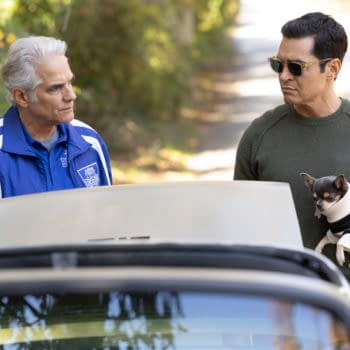Posted in: TV | Tagged: channel 4, simon pegg, undeclared war
State Secrets Hidden & Uncovered In Channel 4 The Undeclared War Q&A
The Undeclared War, the new cyberwarfare thriller TV series for Channel 4, invited Bleeding Cool to join a question and answer session after a screening of the first episode. You can read a review of that right here. We got to hear what everyone thought about the upcoming privatisation of Channel 4. Five years in the making, The Undeclared War is a new Channel 4 drama airing on Thursday 30th June at 9pm, and will be available on All 4, as well as on Peacock in the US next month. Starring Hannah Khalique-Brown, Adrian Lester, Alex Jennings, Maisie Richardson-Sellers, Kerry Godliman and Simon Pegg, The Undeclared War has been written and directed by Wolf Hall and The Government Inspector's Peter Kosminsky, and is set in 2024, in the run-up to a British General Election, when a major cyber-attack hits the country, knocking out the internet – but not social media. The worst nightmare of all.
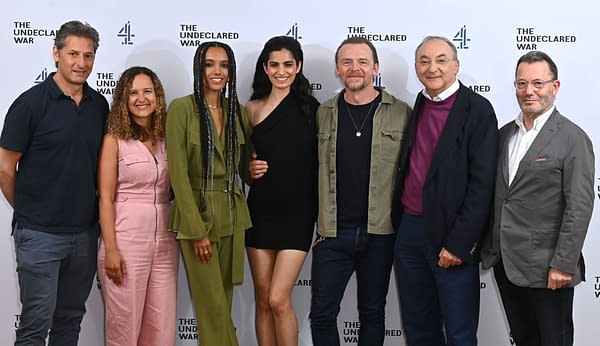
As to the origins of the show, Peter Kosminsky told us "we did a lot of research and tried to extrapolate one possible future. I'm not saying this is what will happen, I'm saying everything we show is being gamed by the security organizations in this country and overseas. There's nothing far-fetched or unrealistic here but whether in fact, it will happen this way, or whether it will happen a different way or not happen at all, is beyond me." But as for how they came by the information that they did, we will ever know. Peter commented "there are documentary makers here in the audience, I won't embarrass them by saying who, but the problem is they have is to get people to go on camera. Or they use various techniques to have actors read their lines. The advantage we have is that people can talk to us and it will never be acknowledged, never attributed, they don't have to go on camera and we will deal with the information and use the information they give us in such a way that it disguises its source. And I've been doing essentially that for decades. You can gather from the fact that it took five years, that it was a long process, we spoke to lots of people who knew a lot about this subject and not just in this country on both sides of the Atlantic. Beyond that, I'm really sorry to be unhelpful but I can't really answer that."
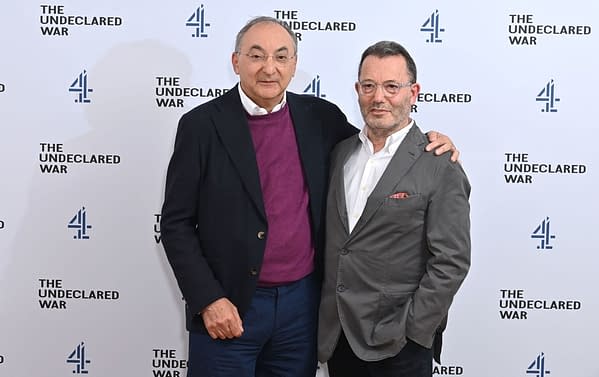
Longstanding Channel 4 producer Sir Colin Callender stated how the show "came out as a result of a conversation that Peter and I had five years ago, we were discussing an article in the New Yorker about active measures about the role that governments have played in meddling in foreign governments' political processes. This was obviously coming on the heels of the 2016 election and we thought this was rich territory. My thought was, let's do something historical. It was Peter who said no, let's do something said in the future. That's about this notion that the new frontier is the cyber front, and so the show grew out of that. As Peter researched it more fully with access that only a filmmaker of Peter's calibre and track record could actually get, all the pieces of the story began to fall into place and so the story told itself, growing out of the research."
We also got to learn more about one gentleman I had met before the screening, Ollie Whitehouse, who wrote all the on-screen code. Peter praised his work saying "he and I have worked together for the full five years of the project and he and his team were incredibly generous, and have refused all payment. Every piece of code you see on the screen has been written with its particular function in mind, it's not just made up but what's more, Olly was very careful that if some of it was malware, and in fact, a lot of it is malware, that there was nothing in it that could actually be used to be dangerous. Luckily he and his team are extremely knowledgeable about this subject, so I didn't have to be."
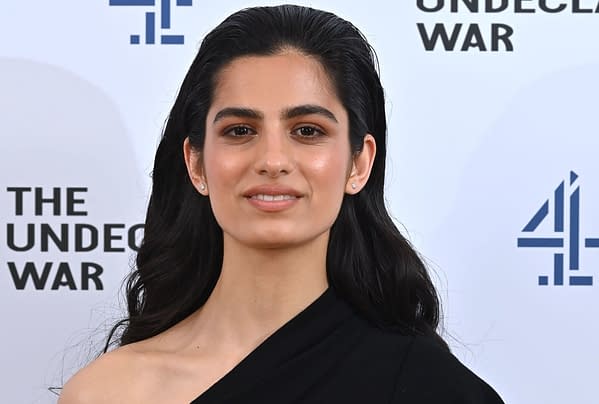
But knowledgeable he was. Hannah Khalique-Brown talked about the lead character she plays, Saara Parvin, "even in the audition process, I got sides of A4 paper with information about Saara's life, her childhood, her upbringing, her character's personality, her memories which is unheard of in the casting process. I mean to get that much information ever at all is very special, and very rare, and it's just an extraordinary part of working with Peter and it's absolute gold dust for actors. I'm very keen on creating a human life and a human history that's not me… in forensic detail, bringing it to life and then asking it to step into me… and it was just a complete dream to get all of this info, about your memories even."
Hannah Khalique-Brown also talked more about the non-reality way of demonstrating her character's work, which they dubbed Code World. "This kind of surreal landscape that we get to watch, which is a physical manifestation of everything that's going on in Saara's mind, and in the code that she's working with when she's in her zone. It serves two really useful purposes, in that it can show the audience and the ordinary lay person who doesn't know how to code, the structure of the thinking the patterns in which she approaches things, and sheds light on the way that the coder's mind works. Calling up tools like a tool belt, which is you know a familiar image to us, but it's very similar to how coding works. If you think about the magnifying glass, or the chisel, or the crowbar that she picks out, those are all tools from a library of available things that she can use within code to help her get to the next step. It also serves a purpose, to help me find out how her brain works, and because Saara is extraordinary at what she does, she's not just a good coder, she's an astonishingly talented coder, and so she does think differently. She thinks ten steps ahead of anyone else, and thinks of things that other people miss. It really helped me, as an actor, understand and that paired with learning how to code which I thought was necessary for the role. Peter discussed this the day after I got the part, we talked about how Saara is a genius and if I want to come close to understanding the way her mind works, I have to at least stick my toes in. So I taught myself two programming languages and got to grips with coding to at least a basic level, and it really made sense of Code World, like the penny dropped. It was great fun to shoot as well, amongst all the emotionally demanding traumatic scenes, like jumping into the sea and stunts, that was cool."
As to the character of Saara and her role in the world of GCHQ that she is discovering, Hannah told is "she knows she's good, and she wants to be there because she's good, not because she happens to tick certain boxes so this was just me trying to investigate that dynamic really. The way we understand she's good is through this remarkable depiction of the way she thinks, which I don't think I've seen quite in the same way." Peter Kosminsky added "We spoke to many people who suggested to me that, for one reason or another, the environment within GCHQ is is pretty male and fairly monoglot and I thought it would be interesting to create a character who felt themselves to be an outsider in that world. There aren't many female reverse engineers I believe at GCHQ, so I thought it would be interesting if that person was female and I'm pretty certain they would want to be trying to diversify their intake so it would make sense that they might want to do that. And by the same token, they might want to try to diversify their ethnic background, and you can see the impact that that has on Saara, as I played so beautifully by Hannah as she says "is that why you chose me? because I've got a brown face?" So from her point of view, as a coding prodigy really who is totally underestimated by the people who she's working for."
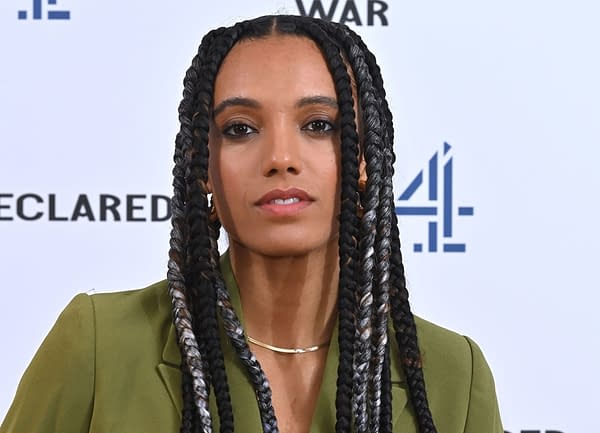
Maisie Richardson-Sellers echoed the character research detail for her own role as Kathy, an agent from NSA who has been seconded to GCHQ and finds kinship with Saara. "With Kathy, we were talking about her history with her father who is a policeman, who was heavily involved in 9/11 and as a consequence of seeing the trauma that caused within him, Kathy – who has a military background – decides to step away and focus more on trying to prevent warfare from happening in the first place. This is what brings her to GCHQ. And Peter is a homing device on set because, anytime there's any doubt or sway, you can go to him and he has a plethora of information and thoughts and ideas and you are discussing real people. It makes the threat all that more visceral and intense and it's so easy to just slip, trustingly, into Peter's world…. From Peter's extensive research, in the NSA, it is a lot more diverse, it's a lot more collaborative and I think it's interesting to see the way that she reacts to being in this homogenous world and then when Saara enters, it's a familiar face, and they are drawn to each other. Saara's fire and outspokenness, the way that she is unapologetically herself within this very intimidating world, draws her to do some things that she wouldn't necessarily think of, because she trusts Saara. And they go down this fantastic journey together, get very close and it's really nice to see these two young women who are both within quite an alien space but, who are incredibly talented and skilled at what they do. And they decide to carve their own path out, exploring that grey area between what's right and what's wrong morally, but decide to trust their guts and follow it through, and some very interesting things happen as a consequence."
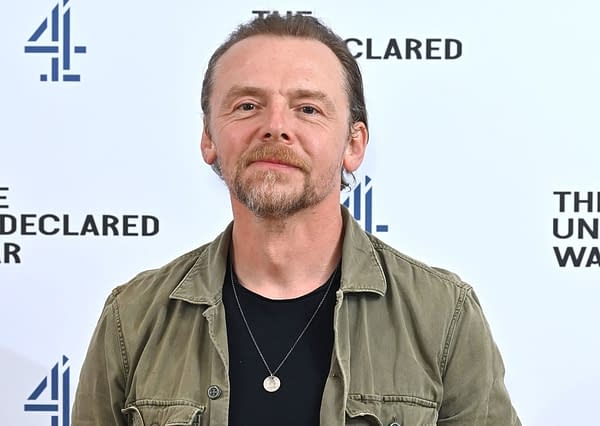
Simon Pegg told us of his character, and operations head of GCHQ, Danny. "I knew all about Danny's family, about where he lived, where he grew, up the fact that he was adopted and that he lived in foster homes and then eventually he was a big rugby player, which is why I chose to have the little stress rugby ball which I bought myself from Amazon. Never claimed for it." Apparently, it is now a chew toy for his dog. "It was so wonderful to know all that stuff. I'm a big believer in acting just being pretending, it's what we do when we're kids, but there's no doubt whatsoever for me having two sides of A4 all about Danny's life, really helped me to understand who that man was and what was at stake for him."
As for taking the role, "I was extremely flattered to be sent the script, just because it's not the kind of role normally people assume that I'm interested in. And I'm pretty bad at reading scripts, I put them off but I picked up episode one of The Undeclared War and I didn't stop until I finished episode six, I was so gripped by the story, and the idea of actually being part of such an extraordinary piece of television, to get to work with Peter, who has created so many fantastic works of art over the years… it just felt like a no-brainer to me. I was immediately on the phone, "yes please, I'd like to come home." Danny's the den mother there and he's looking after all those people and he's very much a father figure to all those coders, but you know he's a human being so he has light moments and dark moments, but it is a more dramatic role and something that I really relished."
Simon Pegg told me "I relate more to Danny now in my life at 52 than I do to Shaun or any of those characters I've played" who are often "stoners who don't know what to do with their life. Danny knows exactly what to do with his life and he's extremely adept at executing that. It was really enjoyable to play a character who was so far from the sort of thing I'm known for playing, and as an actor that's all you can ever hope for really, to be given challenges and this was a glorious glorious challenge." Sir Collin added, "Simon's answers to your question about this is one of the precise reasons he was cast."
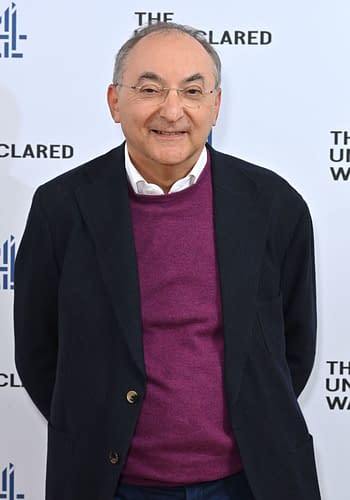
Peter Kosminsky's work has dealt with the way the British state applies force around the world, whether in the Middle East or with British Muslims, but this time it is the British government that is on the back foot, and under threat from a greater force. He talked about his motivation to tell this particular story. "The reason I wanted to make this is the same reason I've always wanted to make stuff. If you discover that there is something going on that you didn't know about you know and I'm a reasonably well-read person so if I don't know about it, there's a fairly safe assumption that a lot of people won't know about it, then it's my job to cast some light on it. And the best way to do that in my rather blinkered view is you take a relatively ordinary outsider if you can call Saara Parvin ordinary and you send her into a situation and, with her, we learn what's going on. So obviously in this case Saara is the surrogate for the audience, or for me. There is a hot war going on in cyberspace between a number of antagonists in this particular case Britain and Russia and it's really dangerous. I think I was really shocked by the fragility of our hugely internet-dependent society. I just wanted people to be more aware of this. The Undeclared war is a cautionary tale, it's very thoroughly researched, it took five years to make. I'm not saying this is the way things will turn out, but I'm saying there's nothing in this show that either hasn't happened or is not being wargamed by the people here and in other countries who try to prepare for this kind of thing. There are no test techniques shown or strategies described that aren't happening and aren't real. The characters are completely fictional, and I called it a cautionary tale because I think that if we're not careful, this hot war will escalate to the point where it threatens our civilization. I think it's as serious as that, so that's why I want to tell the story."
As to the coincidental reflections of recent British political moves through Partygate and beyond,"there's always a sort of lively conflict between civil servants, particularly highly technically skilled civil servants who have one set of imperatives and politicians who obviously instruct and command civil servants but often from a very different agenda and so it would have been impossible to tell the story without showing the constraints within which they operate and how, when the nature of a government changes, and this is a populist government trying to please a constituent base. And obviously, we're familiar with that phenomenon elsewhere, then there may be a very real apparent conflict between what some of these civil servants seem to be the right thing to do, and what those populist politicians might feel is a political necessity." Heaven forfend, Peter, heaven forfend…






